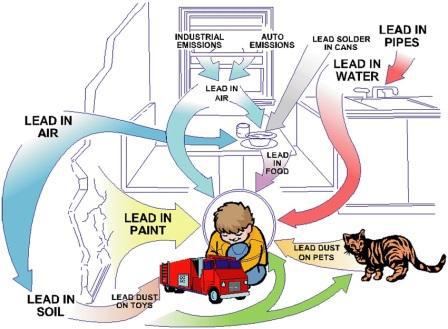
Beyond the well-known effects of childhood lead exposure on IQ, a new study suggests lasting effects on the brain may extend to personality traits in adulthood.
Among more than 500 New Zealanders whose blood lead levels were tested when they were children, those with higher levels as kids were more likely to have personality traits that have been linked to a number of poor life outcomes, including greater psychopathology, worse physical health, less job satisfaction and troubled interpersonal relationships.
“We were following up in folks who were born decades ago when lead was still very much present in our atmosphere,” said Aaron Reuben, a doctoral candidate in clinical psychology at Duke University in Durham, North Carolina. “We asked the question: if a person was exposed to lead in childhood, would it affect them in adulthood in terms of their mental health and personality?”
Although the effects Reuben’s team found were “modest,” they were comparable to results in past studies in these same New Zealanders, including a small drop in IQ and a slightly greater risk for criminal behavior, he said. Moreover, the impact of lead turned out to be comparable to that of other modifiable risk factors, such as abuse during childhood.
Peak levels of lead in the air coincided with its use in gasoline between the 1940s and the early 1990s, Reuben’s team writes in JAMA Psychiatry. From 1976 to 1980, they note, the average child in the U.S. had blood lead levels three times higher than the current standard for clinical attention.
The researchers analyzed data from a large multigenerational health study, focusing on 579 people born in 1972 and 1973 in Dunedin, New Zealand. Participants had their blood tested for lead at age 11 and were interviewed every two to six years in adulthood to check for indicators of mental disorders. They were also asked to nominate people who knew them well to describe them using a 25-item questionnaire that measured five personality traits: neuroticism, extraversion, openness to experience, agreeableness and conscientiousness.
The results showed that people with higher lead levels as kids “were a little more neurotic, a little less agreeable, a little less conscientious,” Reuben said. “And those factors influence how well you do in your job and interpersonal relationships.”
Each 5-microgram per deciliter increase in blood lead levels at age 11 was associated with a 34 percent increase in adulthood in the odds of general psychopathological symptoms like disordered thinking, and with small increases in levels of neuroticism as well as decreases in agreeableness and conscientiousness, the study found.
These associations cannot prove cause and effect, but the researchers were able to account for a variety of factors that might influence the results. For example, they show that childhood socioeconomic status was not linked to the adult psychiatric traits.
While other studies have looked at the effects of lead exposure on the risk of future antisocial behavior, ADHD and IQ, “these researchers looked at personality traits,” said Joel Nigg, a professor of psychiatry, pediatrics and behavioral neuroscience at the Oregon Health and Science University in Portland. “That’s a nice extension.”
It’s important to note “that those were pretty high blood levels of lead compared to what you see today,” said Nigg, who was not involved in the new study. “They are about 10 times as high as you see in American kids today.”
Still, Nigg said, “there’s a lot of work showing that much lower levels of lead are related to mental health problems in children. Though we don’t have longitudinal data, the short-range data show the same kinds of effects (as reported in the new study) at low lead levels.”
Nigg’s own research has shown that genetics can play a role in the impact of lead exposure. “The effect of lead on development can be very different depending on one’s genetic makeup,” he said.
That means that the effects measured in a study like Reuben’s might be bigger for some kids and smaller for others than the average that is reported, Nigg said. “Our study showed that some kids were very susceptible in terms of ADHD.”
Source: Reuters
 FR
FR EN
EN AR
AR








